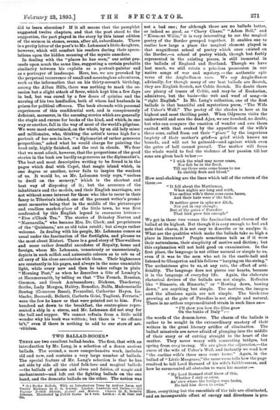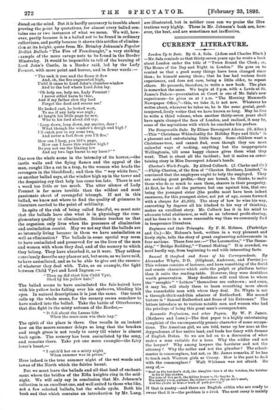TWO BALLAD-BOOKS.* THESE are two excellent ballad-books. The first, that
with an introduction by Mr. Lang, is a selection of a dozen ancient ballads. The second, a more comprehensive work, includes old and new, and contains a very large number of ballads. The special feature of Mr. Lang's selection is that he has set side by side all the chief folk-lore and magical ballads —the ballads of ghosts and elves and fairies, of magic and enchantment—and left out the fighting ballads on the one hand, and the domestic ballads on the other. The notion was
• (I.) Border Ballads. With an Introductory Fssay by Andrew Lang. and Twelve Etchings by C. 0. Murray. London: Lawrence and Bulleu.—(2.) Popular B, itish Ballads, di,cient and Modern. ( hosen by IL Brimley Johnson. illustrated by Pulaltt Cooke. In 4 vols. London: J. M. Dent and .00,
not a bad one ; for although there are no ballads better, or indeed so good, as "Chevy Chase," "Adam Bell," and " Kinmont Willie," it is very interesting to see the magical poetry of the Border grouped together. It enables one to realise how large a place the magical element played in that magnificent school of poetry which once existed on the Border,—a school of poetry which, though but feebly represented in the existing pieces, is still immortal in the ballads of England and Scotland. Though we have
lost much, we still retain a priceless possession in our native songs of war and mystery,— the authentic epic verse of the Anglo-Saxon race. We say Anglo-Saxon advisedly, for though many of our best ballads are Scotch, they are English Scotch, not Celtic Scotch. No doubt there
are plenty of traces of Celtic, and may-be of Euskarian, admixture, but the basis—the web and woof of song—is "right English." In Mr. Lang's collection, one of the first ballads is that beautiful and mysterious poem, "The Wife of Usher's Well." The poetry of the shades is here at its highest and most thrilling point. When Odysseus visits the underworld and sees the dead Ajax, we are touched, no doubt; but who can compare the emotion of wonder and awe there excited with that evoked by the apparition of the wife's three sons, called from out their " place " by the imperious impiety of their mother's grief—a grief which knows no bounds, and will not be gainsaid—and against which even the gates of hell cannot prevail. The mother will force the whole world to feel the violence of her passion till her sons are given back to her :—
"I wish the wind may never cease. Nor fish be in the flood,
Till my three sons come hame to me In earthly flesh and blood."
How soul-shaking are the lines which tell of the return of the three
"It fell about the Martinmas, When nights are long and mirk,
The carline wife's three sons came hame, And their hats were o' the birk.
It neither grew in syke nor ditch, Nor yet in ony sheugh ;
But at the gates o' Paradise That birk grew fair enough."
We get in these two verses the fascination and charm of the ballad at its highest. Bat though it is easy enough to feel and note that charm, it is not easy to describe or to analyse it. What are the qualities which make the ballads take so high a place in literature ? People sometimes talk as if it were their naturalness, their simplicity of motive and diction ; but
this explanation will not hold good on examination. In the first place, the language is not either natural or simple to us, even if it was to the men who sat in the castle-hall and listened to Glasgerion and his fellows "harping on the string."
The archaicisms give to us, at any rate, the effect of arti- ficiality. The language does not pierce our hearts, because it is the language of everyday life. Again, the elaborate rhetorical devices of the ballads are not simple. Refrains like " Binnorie, oh Binnorie," or "Bowing down, bowing down," are anything but simple. The motives, the images, and the allusions again are not simple. The birch-tree growing at the gate of Paradise is not simple and natural. There is no artless unpremeditated strain in such lines as- " I'll show you how the lilies grow On the banks of Italy" :— the words of the demon-lover. The charm of the ballads is
rather to be sought in the extraordinary mastery of their writers in the great literary artifice of elimination. The ballad minstrels are never afraid of plunging into the middle of their story or of cutting straight to the heart of the matter. They never weary with connecting bridges, but spring from crag to crag. We are given the adjuration,—the curse of the wife of Usher's Well, and instantly we read how "the carline wife's three sons came hame." Again, in the ballad of "Little Musgrave," the same verse tells how the page resolved to tell Lord Barnard of his wife's faithlessness, and how he surmounted all obstacles to warn his master "My Lord Barnard shall know of this, Whether I sink or swim.
An' ever where the bridges were broke, He laid him down to swim."
Here, everything but the essentials of the tale are eliminated, and an incomparable effect of energy and directness is pro-
dueed on the mind. But it is hardly necessary to trouble about proving the point by quotations, for almost every ballad con- tains one or two instances of what we mean. We will, how- ever, partly because it is a ballad not to be found in ordinary collections, and partly because it shows this artifice of elimina-
tion at its height, quote from Mr. Brimley Johnson's Popular British Ballads "The Fire of Frendraught," a very striking sample of the more savage note to be found in the Border Minstrelsy. It would be impossible to tell of the burning of
Lord John's Castle, in a Border raid, led by the Lady Frennet, with more point and horror, and in fewer words :—
"The reek it rose and the flame it flew And, oh, the fire augmented high,
Until it came to Lord John's chamber-window And to the bed where Lord John lay.
'Oh help me, help me, Lady Frennet !
I never ettled harm to thee, And if my father slew thy lord Forget the deed and rescue me.'
He looked east, he looked west,
To see if any help was nigh ; At length his little page he saw,
Who to his lord aloud did cry.
Loup down, loup down, my master, clear! What though the window's dreigh and high ? 1 11 catch you in my arms twa, And never a foot from you I'll flee.'
How can I loup, ou ]ittie page, How can I leave this window high ? Do you not see the blazing low And my twa legs burnt to my knee ?' " One sees the whole scene in the intensity of its horror,—the castle walls and the flying flames and the appeal of the man, caught like a rat in a trap, to the woman who heads the revengers in the blood-feud; and then the " wey white face," as another ballad says, at the window high up in the tower and the despairing cry that help has come too late. There is not a word too little or too much. The utter silence of Lady Frennet is far more terrible than the wildest and most passionate shout of revengeful triumph. If not in this ballad, we know not where to find the quality of grimness in literature carried to the point of sublimity.
In spite of the risk of being called fanciful, we must note that the ballads have also what is in physiology the com- plementary quality to elimination. Science teaches us that the organism only lives when the processes of elimination and assimilation coexist. May we not say that the ballads are so intensely living because in them we have assimilation as well as elimination? The ballads in some special way seem to have assimilated and preserved for us the lives of the men and women with whom they deal, and of the scenery to which they belong. They have absorbed it, as it were. They seldom cansciously describe any place or act, but seem, as we have said, to have assimilated, and so to be able to give out the essence of whatever they deal with. Take, as an example, the fight between Child Vyet and Lord Ingram :—
" Then up did start him Child Vyet, Shed by his yellow hair."
The ballad seems to have assimilated the fair-haired hero with his yellow locks falling over his eyebrows, blinding his eyes. In natural descriptions it is just the same. One touch calls up the whole scene, for the scenery seems somehow to have soaked into the ballad. Take the battle of Otterbourne, that dim fight in the misty autumn of the Border,—
" It fell about the Lamas tide
When the muir-men win their hay."
The spirit of the place is there. One recalls in an instant how on the moors summer delays so long that the bracken and rough grass is not ready to carry till winter is almost back again. The scenery has been assimilated by the song, and remains there. Take yet one more example—the fairy lover's boast,—
" I eateh'd her on a misty night When summer was in prime."
Here indeed is the true summer night of the wet woods and lawns of the North which the fairies haunt.
But we must leave the ballads and all that land of enchant- ment where the bridles of the Elfin knights ring in the mid- night. We will only say in conclusion that Mr. Johnson's collection is an excellent one, and well suited to those who like, not a few selected ballads, but the whole cycle. Both his book and that which contains an introduction by Mr. Lang, are illustrated, but in neither case can we praise the illue trations very highly. Those in Mr. Johnson's book are, how- ever, the best, and are sometimes not ineffective.



































 Previous page
Previous page